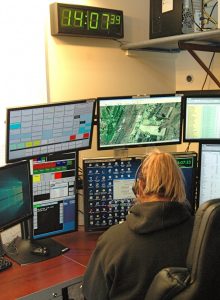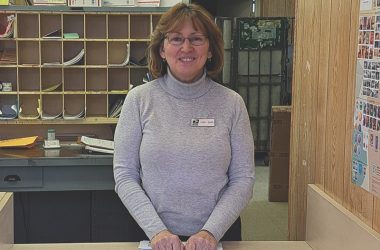Morgan County’s emergency dispatchers field the calls that few people want to make. Every day, 24 hours a day, there is someone at the Morgan County 911 center to answer calls for medical help, police protection, fire response or all of the above.
Some calls are brief, while others set off a day-long chain of emergency response. Some days are quiet, and others aren’t. That’s the nature of the job – being prepared to meet the unexpected.
This week, April 8-14, is National Public Safety Telecommunicators Week. Local dispatchers let us have a look inside the unique job they do. Morgan County employs 11 dispatchers, eight of them full time.
David Ward has been a 911 dispatcher in Morgan County for more than a decade. He was supposed to be retired, but was delivering pizzas locally when a dispatcher told him they could use help at the center. Ward got trained in-house and took to the job.
He said the best part of the job is helping people.
“When people call here, they need help. I don’t provide the help personally, but I send it to them,” Ward said.
He’s seen the local 911 call volume go up. A lot more overdose calls. He’s also watched the training change, become more demanding.
Ward has a calm demeanor. Assistant 911 Director Sarah Hogbin said he’s hard to ruffle. It’s a good trait to have as a dispatcher. When people call 911, they’re nervous, hurt, scared, in danger, angry. Dispatchers have to talk them through the call to get information needed to send help.
“They call it repetitive persistence,” said Ward. “Talk to them in a calming manner until they calm down.”
Getting help to a person in need is the job of the dispatcher. He or she must determine what’s happening and where, then follow protocols to send out the right agency to respond.
“People tend to blame you if help doesn’t come fast. And it’s never as fast as they think it should be,” Ward said.
“It’s not for everybody. You have to really want to do it,” he said of the job. “You feel the caller’s stress and can take that home with you if you’re not careful.”
Hogbin has been a dispatcher for almost five years. She was hired as the Assistant 911 Director last year. She said there are a lot of things about the job she didn’t expect when Director Zach Caldwell recruited her to dispatch.
“You learn so much about the community. I wasn’t expecting the emotional connection with callers. I wasn’t expecting the emotional connection with responders,” she said. “You have to be empathetic without being soft.”
The work schedule for a dispatcher can be tough on families. A 911 center has to always be staffed, and shifts can be affected by bad weather or illness or need.
“It’s really hard on our families,” said Hogbin.
Another challenge can be protecting the privacy of the calls that come into 911. While many local people listen to fire and police calls on the scanner, what the public hears is only part of the picture.
“Never is anything what it appears,” Hogbin said.
Much of the time, dispatchers don’t know how a call ends — whether the person who calls for help is okay in the end, she said.
Establishing trust with responders is crucial, said Hogbin. A 911 call is a two-way street – the public needs help, but responders may also need assistance – information, backup, more units to help.
Ward said dispatchers work most closely with local law enforcement officers. Dispatching protocols require they check in with law enforcement officers every seven minutes.
“If they don’t answer, we’re sending someone to check on them,” Ward said.
Printed cards, written policies and computer software tell dispatchers what questions to ask and what units to send in response to an incident.
Multiple computer screens show every address in Morgan County, how to reach the location, what roads might be closed, what public safety units are already on calls and where. Emergencies don’t always happen one at a time.
“You have to be a good listener and have a good memory,” said Ward.
“You do it right the first time or people can die,” Hogbin said. “You have to have tough skin. But it’s rewarding, knowing you did the best that you could, that you helped the best way you could.”
“It’s not the job for everyone. I think this is a great job. It’s eye-opening,” she said. “We don’t want people to be afraid to call 911. There’s always going to be someone here to help.”

Morgan County dispatchers rely on mapping, phone and radio data to get responders out in an emergency.









